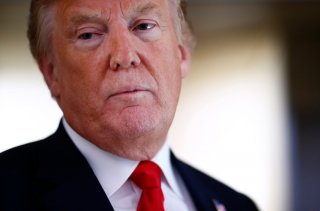Why Donald Trump’s ‘Strategic Approach’ to China Is Wrong
The Trump administration has developed an incorrect diagnosis of the nature and scope of the challenge China poses to the United States. Due to this misdiagnosis, it has issued some prescriptions that will probably be ineffective or even counterproductive.
On balance, the White House China strategy is commendable for its survey of the multiple challenges that the United States faces from China, and the multiple policies Washington is pursuing to respond to those challenges. The strategy also appropriately emphasizes that Washington is “open to constructive, results-oriented engagement and cooperation from China.” On the other hand, it continues to uphold some of the Trump administration’s earlier invalid assumptions about the history of U.S.-China engagement, and—more importantly—about the extent of Beijing’s strategic ambitions. As a result, its “fundamental reevaluation of how the United States understands and responds to” China’s leaders is still based on some flawed premises. And it offers Beijing few positive incentives or alternatives to an increasingly confrontational, zero-sum relationship.
Moreover, the strategy probably overestimates the leverage Washington has in dealing with Beijing, by neglecting to address the budgetary constraints on a highly “competitive” approach to China, and the potential support for such an approach among U.S. allies and partners who do not uniformly share U.S. threat perceptions of China and who have growing doubts about U.S. credibility and reliability. Perhaps most importantly, the White House strategy fails to address the historically profound domestic trends in the United States that are eroding its competitiveness against China. The cumulative impact of tribal political warfare, mismanagement—and politicization—of the U.S. response to the coronavirus pandemic, and the resurgence of racial tensions and social unrest in the wake of the death of George Floyd, has greatly undermined the United States’ ability to project internationally an appealing model of governance and development to compete with the model being touted by Beijing. This should be the foundation of the American response to the challenge from China but the United States is well behind the curve in its readiness for the contest.
Paul Heer is a Distinguished Fellow at the Center for the National Interest dealing with Chinese and East Asian issues. He served as National Intelligence Officer for East Asia from 2007 to 2015. He has also served as Robert E. Wilhelm Research Fellow at the Massachusetts Institute of Technology’s Center for International Studies and as Adjunct Professor at George Washington University’s Elliott School of International Affairs. He is the author of Mr. X and the Pacific: George F. Kennan and American Policy in East Asia (Cornell University Press, 2018).
Image: Reuters

